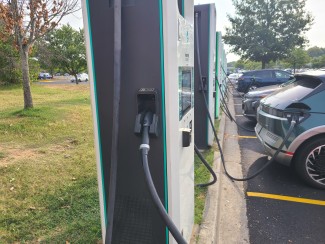New research from the American Council for an Energy-Efficient Economy (ACEEE) finds that making average electric vehicles as efficient as their higher-performing peers can reduce the Read the White Paperupfront cost of an EV by almost $5,000 and cut charging costs by nearly a third. Improving the efficiency of a 300-mile-range EV can give it the same range with much smaller batteries, significantly cutting costs.
Many EVs on the road today travel about 2.5 miles for each kilowatt hour of electricity stored in the battery. The best-selling EV in America, the Tesla Model Y, travels 3.5 miles per kilowatt hour (mi/kWh), a 40% increase. At today’s battery prices, reducing the size of a battery by 40% while maintaining the same range translates into a $4,800 savings.
Though the Model Y is among the more efficient EVs on the road today, others achieve even greater distances per kilowatt-hour due to better efficiency. The Hyundai Ioniq 6 can travel 4.2 mi/kWh, and the Lucid Air Pure is the first EV to achieve 5 mi/kWh. At the other end of the spectrum, the inefficient 9,000-pound GMC Hummer EV gets only 1.4 mi/kWh. To improve EV efficiency, automakers can improve battery performance, reduce vehicle weight, enhance aerodynamics, and use the latest technologies, such as optimized powertrains.
“We have made huge gains in the efficiency of gasoline-powered cars, and we must do the same for EVs to lower costs and cut pollution,” said Peter Huether, lead author of the paper and senior transportation research associate at ACEEE. “Manufacturing more affordable EVs that use less critical mineral material for batteries means we can produce more EVs and speed the transition away from cars that burn fossil fuels.”
By eliminating the need for gasoline, EVs dramatically reduce driving costs—and more efficient EVs can lower them even further. The average cost to fuel a car with gasoline is about $2,000 a year. For an EV with mediocre efficiency (2.5 mi/kWh), charging costs average about $960 annually. For a more efficient EV (3.5 mi/kWh), charging costs drop to $680 a year, a 29% savings.
Efficient EVs help address range anxiety, strain on the power grid, and pollution
Greater efficiency means getting to a full charge faster because every minute the battery charges, more miles are gained, which could help assuage the range anxiety that deters some potential EV buyers. The only way to increase range without improving efficiency is with larger batteries, which adds cost while decreasing efficiency due to the added weight.
Widespread vehicle electrification will require significant investments in the electric grid. Making EVs more efficient will lessen the strain on the grid and reduce electricity system costs. Compared to the average electricity usage of today’s EVs, an all-EV future with vehicles that achieve an average efficiency of today’s best-in-class models would save enough electricity to power 21 million homes for a year.
The electric grid is getting cleaner, but it still relies on fossil fuels for some power generation, so a 40% more efficient EV will significantly reduce carbon emissions and pollutants that directly damage human health, such as sulfur dioxide, nitrogen oxides, and particulate matter. Though EVs can contribute to emissions upstream from the electricity they use, these emissions are far less than those from gasoline-powered vehicles, which come from both combustion in the engine and emissions from oil drilling and gasoline refining.
The average carbon dioxide emitted by a gasoline-powered car is more than three times the upstream carbon created per mile of driving an EV with even mediocre efficiency. As the electric grid continues to add renewable capacity in the coming years, upstream emissions from EVs will continue to decline.
Policymakers can encourage more efficient EVs
Federal, state, and local governments can enact policies to encourage EV efficiency. States and cities can set EV registration fees based on vehicle weight, such as in Oklahoma and DC. ACEEE’s paper recommends states explore EV registration fees based on efficiency. Many states provide tax credits or rebates for buying EVs, but none give a greater subsidy for more efficient EVs, an approach the paper recommends.
The Environmental Protection Agency’s greenhouse gas emissions standards for cars treat all EVs as zero-emissions, providing no incentive to improve EV efficiency. ACEEE has long argued that the EPA should set vehicle standards that account for EV electricity emissions. The paper also calls for expanding federally supported research on improving battery energy density, which can reduce battery weight without sacrificing energy storage.

